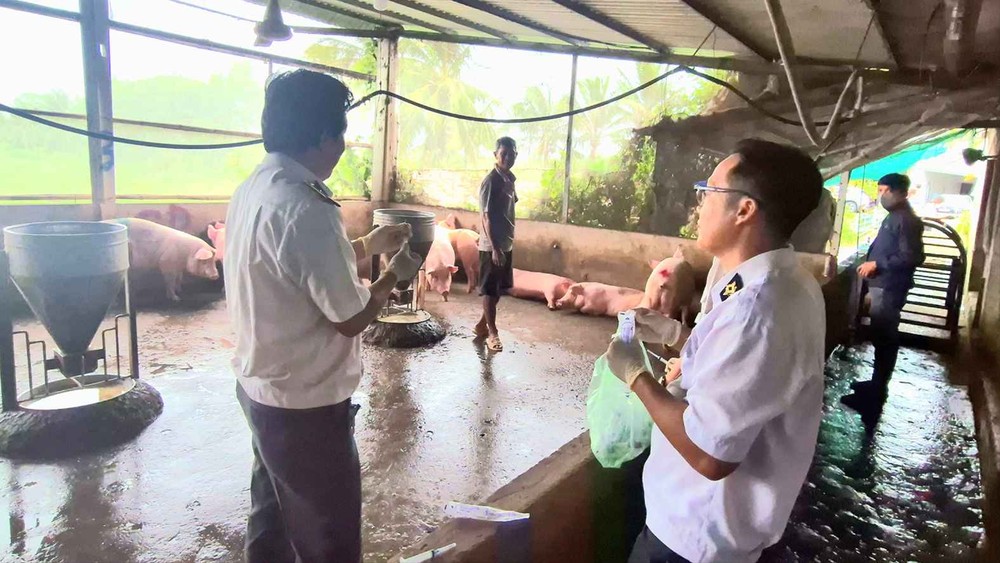
Key actions include tightening border controls to prevent the illegal smuggling of infected pigs, a critical step in containing the disease's spread. Furthermore, authorities are enforcing strict penalties for any cases of disease concealment, emphasizing transparency and rapid reporting as essential to effective containment. Close monitoring and regulation are also being applied to slaughtering, transportation, and trading activities of pigs and pork products to interrupt transmission chains and ensure public safety.
These intensified efforts underscore a proactive approach by local authorities to safeguard the nation's swine industry and protect public health amidst the ongoing ASF challenge.
The People's Committee of Bao Lam 1 Commune in Lam Dong Province, in collaboration with relevant agencies, has culled a total of 240 pigs owned by a resident in Hamlet 5 of Bao Lam 1 Commune, after confirming their infection with African swine fever. Before the culling took place, the resident’s farm reported the death of 31 pigs, which displayed symptoms including high fever, loss of appetite, lethargy, and difficulty breathing.
Samples from the deceased pigs were sent to the Central Veterinary Diagnosis and Testing Center II, part of the Department of Livestock Production and Animal Health under the Ministry of Agriculture and Environment in Dak Lak Province, for testing, which confirmed the presence of the African swine fever virus.
In Vinh Long Province, authorities have recently identified an outbreak of African swine fever at a livestock farm in Thanh Thuan Hamlet of My Thuan Commune. The affected herd included 37 market pigs that were purchased from a trader outside the province on July 1. After eight pigs died under unexplained circumstances, the farm owner quickly notified the authorities. The Vinh Long Sub-Department of Livestock Production and Animal Health, in conjunction with the Central Veterinary Diagnosis and Testing Center II, collected samples that all tested positive for the virus.
Likewise, the Sub-department of Agriculture in Tay Ninh Province has reported that since the start of 2025, African swine fever has impacted 22 livestock households in the communes of Tan Hung, Thanh Hoa, Ben Luc, Tan Tru, Vinh Hung, Chau Thanh, Moc Hoa, and Tan Thanh, leading to the culling of 717 pigs. In Can Tho City, veterinary authorities have identified three outbreaks since the beginning of 2025, resulting in the culling of 52 pigs.
The Department of Agriculture and Environment in Tuyen Quang Province has reported a surge in African swine fever outbreaks in several communes near the border. Veterinary authorities have confirmed the presence of the virus in communes such as Bach Dich, Can Ty, Tung Vai, and Nghia Thuan which are areas along the border with China, where residents from both sides frequently engage in informal trade and cross-border interactions. Authorities have uncovered 129 violations involving the transportation and sale of untraceable pork products across the border. Chinese officials are now working in coordination with Tuyen Quang authorities to curb the spread of the disease and control the movement and trade of infected pigs.
In southern border provinces, African swine fever is also becoming increasingly complex. Without strict control measures, the risk of widespread transmission remains high, especially due to smuggled pigs.
In Tay Ninh-a province with nearly 370 kilometers of border - preventing the illegal entry of pigs poses a major challenge.
Deputy Director Dinh Thi Phuong Khanh of the Tay Ninh Department of Agriculture and Environment emphasized that localities must remain vigilant and committed to preventing the disease’s spread. The province has required pig farmers to sign a commitment to follow the “Five No’s” principle including no concealing of outbreaks; no slaughtering or selling of sick or dead pigs; no trading, consuming, or using diseased, smuggled, or untraceable pork; no dumping of pig carcasses into the environment; and no feeding pigs untreated or unprocessed food waste. Authorities are dedicated to imposing strict penalties on instances of disease concealment that lead to outbreaks.
Local governments in the provinces of Ca Mau, An Giang, and Dong Thap are intensifying public awareness campaigns to highlight the dangers of African swine fever. They are also proactively monitoring for outbreaks, quickly intervening to contain them, and guiding farmers to adopt stricter sanitation and disease prevention practices. Border inspection and quarantine controls have been reinforced to stop and punish illegal pig transport and trade.
The Department of Agriculture and Environment in Can Tho City yesterday also ordered veterinary services and local authorities to step up disease control efforts. Measures include stricter inspections of slaughtering operations, enhanced veterinary hygiene checks of pork and pig offal at local markets, and coordination with relevant sectors to penalize violations in accordance with regulations.
According to the Department of Animal Health under the Ministry of Agriculture and Rural Development, nearly 650 outbreaks of African swine fever have occurred nationwide in the first seven months of 2025, affecting 30 out of 34 provinces and cities, with over 43,000 pigs either infected, dead, or culled. As of now, 256 outbreaks in 26 provinces and cities have yet to pass the 21-day safe period. The department warns that the disease continues to spread due to the high proportion of small-scale farms lacking biosecurity measures.
























